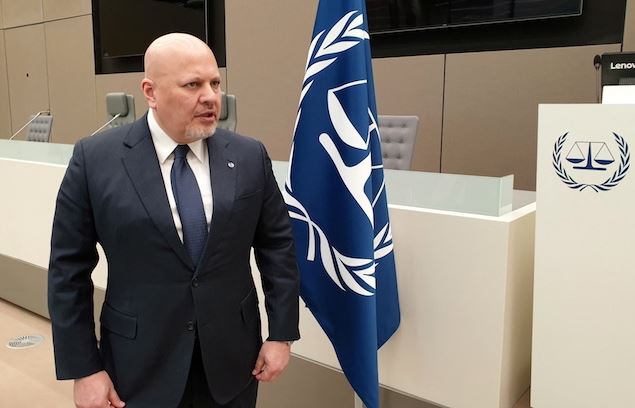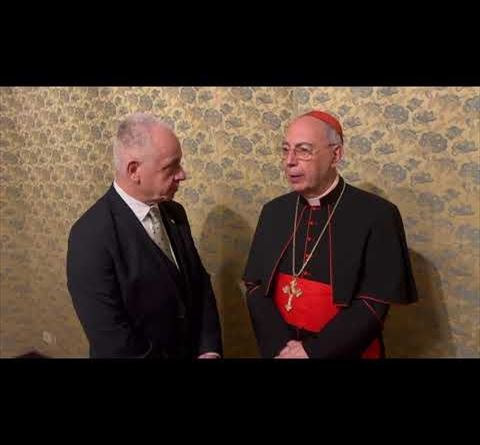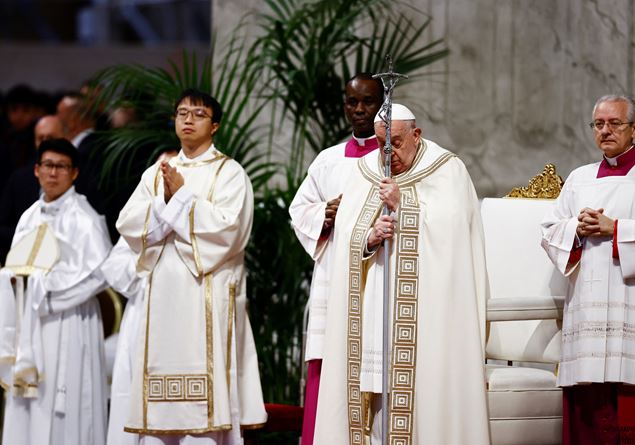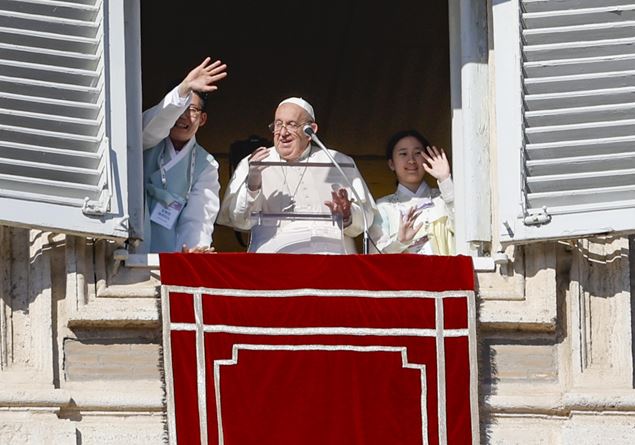
The headquarters of the International Criminal Court in The Hague. Above, prosecutor Karim Khan. The photos in this report are from the oto Reuters agency
The International Criminal Court is a body of jurisdictionso far the first and only, permanent internationalbased in The Hague, Netherlands, competent to judge matters of serious crimes of international importance (genocide, crimes against humanity, war crimes and crime of aggression).
The crime of genocide is defined according to the art. II of the 1948 Convention on the Prevention and Punishment of the Crime of Genocide.
With regard to crimes against humanitydefined under customary international law, must be committed “as part of a widespread and systematic attack against a civilian population with knowledge of the attack”.
As for war crimesthe Court can proceed even when the Geneva Conventions are violated even in non-international contexts, i.e. in civil wars.
The seriousness of the crimes is a fundamental requirement to establish whether the Court has jurisdiction and there is a scale of parameters established by the prosecutor’s office to measure it.
ICC NOT TO BE CONFUSED WITH THE COURT OF JUSTICE
His Statutethe theme of a strong support campaign at the time also by Famiglia Cristiana, was adopted 17 July 1998 with the Diplomatic Conference of Rome and it only came into force much later, on 1 July 2002. 123 countries are currently part of it. Unlike the International Court of Justice, also known as the International Tribunal in The Hague, with which it should not be confused, the International Criminal Court (ICC) in The Hague is not an organ of the United Nationsand, with which it maintains relations governed by an agreement approved by the states parties.
The responsibilities of the two bodies are different: the International Court of Justice in fact acts as an arbiter to resolve disputes regarding the interpretation of international norms arising between member states of the UN who have accepted its jurisdiction. The International Criminal Court in The Hague, on the other hand, acts as a criminal court on an international scale: it has an investigative body that carries out investigations, the Prosecutor’s office, a presidency, a preliminary section, a first instance section, an appeal section and a chancellery.
WHO ARE THE JUDGES
Its 18 judges are elected by the Assembly of States Partiesamong people presented by the States with proven moral qualities, impartiality and integrity. Their term of office lasts 9 years, non-renewable. The Prosecutor and his deputies are also appointed by the Assembly and their autonomous and independent office carries out criminal proceedings. Prosecutors are also in office for nine non-renewable years. Investigations can start motu proprio by the Prosecutor, subject to authorization to proceed from the Pre-Trial Chamber; by referral from the UN Council or by referral from a state partyfor crimes committed on its own territory or on the territory of another state party, in this case it is the responsibility of the Prosecutor to decide whether to start the investigation.
WHEN CAN THE ICC ACT
According to Article 12 of the Rome Statute, it is a precondition that the Court can only take action in the event that it receives news of a crime within its jurisdiction committed in the territory or by a citizen of a State Party. This limit can be overcome if a “non-party” state with a specific formal declaration filed with the Court’s registry decides to accept its jurisdiction, which for example Ukraine did in 2014. The Court’s jurisdiction potentially becomes almost universal, then, when the Council of the United Nations to refer to it, on the basis of Article VII of the UN Charter, situations in which crimes referred to in Article 5 of the Statute are reported. This was the case of the contestation of the crimes committed in Darfur and Libya. However, Article VII itself gives, as a counterbalance to this potentially “global” extension of the Court’s jurisdiction, the UN Security Council the possibility of suspending the investigations and proceedings initiated for a renewable year.
THE COURT AND NATIONAL COURTS
The Court acts with respect to national jurisdictions with a complementary relationship: therefore it leaves the responsibility of prosecuting international crimes to the internal jurisdictions of the states, but intervenes in case of inertia or when the state shows that it does not know (because perhaps in particularly serious crisis conditions the institutions and the judicial system have collapsed) or that it does not “really” want to carry out criminal action, one of those cases occurs when the jurisdiction in the state is not truly independent or when the only formal domestic indictment occurs with the aim of removing the accused from the jurisdiction of the Court of The Hague. The International Criminal Court can indict legal persons or States, but only natural persons who have reached the age of 18, accusing them of crimes committed after 1 July 2002, the date of entry into force of the Statute, for states that entered immediately, from the date of entry onwards for those who entered later, unless there is a formal declaration from the state itself to assert jurisdiction also retroactively. Pursuant to art. 12 of the Rome Statute, the International Criminal Court may exercise its jurisdiction over crimes committed in the territory of a State Party or over crimes committed by a citizen of a State Party. On 20 December 2012 the Italian Parliament with law n. 237 adapted the Italian legal system to the provisions of the statute of the International Criminal Court, regulating the cooperation procedures between the internal jurisdiction and that of the Court and introducing crimes against the administration of the Court into the Italian penal code as required by the statute.
PROSECUTOR KHAN ANNOUNCES UKRAINE INVESTIGATION
On March 3, 2022, Prosecutor Karim Khan announced that he had «Notified the Presidency of the ICC of a decision to immediately open an investigation into the situation in Ukraine. Our evidence gathering work has begun. Among the countries that have given their green light: all members of the European Union, but also Australia, Canada, New Zealand and Switzerland. Latin American countries such as Colombia and Costa Rica have also given their approval.” According to Khan, there is a “reasonable basis” – one of the criteria by which an investigation can be opened at the ICC – “to believe that crimes falling within the jurisdiction of the Court have been committed in Ukraine.” The investigation will cover all acts committed “since November 21, 2013,” including, “all past and present allegations of war crimes, crimes against humanity or genocide committed in any part of the territory of Ukraine by any person.” The prosecutor, however, does not mention the crime of aggression, which he recently noted Giovanni Chiarini on Ispi had previously underlined a lack of jurisdiction, in these terms: «with regard to the crime of aggression, which came into force in 2018and the application of those amendments to the present situation. Given that neither Ukraine nor the Russian Federation are states parties to the Rome Statute, the Court cannot exercise jurisdiction over this alleged crime in this situation.”
WHAT IS THE CRIME OF AGGRESSION
Neither Russia, which signed the Statute but has not ratified it, nor Ukraine, which signed an acceptance of the Court’s jurisdiction in 2014, were parties to the Statute. Regarding the crime of aggressionregulated later than the approval of the statute, let’s try to understand what it is about.
“The act of aggression by the State is formulated” – he writes Claudia Pividori of the human rights study center of the University of Padua – «taking up the provisions of the art. 1 of Resolution 3314 (XXIX) adopted by the United Nations General Assembly in 1974, as “the use of armed force by a State against the sovereignty, territorial integrity or political independence of another State or in any other manner contrary to the Charter of the United Nations”. From the art. 3 of the aforementioned Resolution also includes the exemplary list of actions qualifying as an act of aggression, i.e. military invasion or occupation, bombing, blockade of ports and coasts, sending of mercenary bands, etc. The crime of aggression committed by an individual is defined as “the planning, preparation, initiation or execution, by a person who is in a position to exercise effective control or direct the political and military action of the State, of an act of aggression which, by its character, gravity and extent, constitutes a clear violation of the Charter of the United Nations”. At first glance it appears that the definition of an act of aggression is less detailed than that of a crime of aggression. In fact, the latter case seems to be able to arise only with respect to those acts in clear violation of the UN Charter, or actions characterized by all three indicators identified by the provisions of the amendment (character, gravity and scope of the act). From this it can be deduced that, under the amended Statute of the International Criminal Court, not all acts of aggression capable of giving rise to international state responsibility can at the same time be considered international crimes of the individual.”
THE ARREST WARRANT FOR PUTIN. THE CHARGED DEPORTATION OF CHILDREN
On March 17, 2023, the International Criminal Court issued an arrest warrant for Vladimir Putin and Maria Lvova-Belova, Commissioner for Children’s Rights in the Office of the President of the Russian Federation. They are accused of war crimes, in particular for the illegal deportation of Ukrainian children. According to the indictment, President Putin is responsible for the illegal deportation of children from the occupied areas of Ukraine to the Russian Federation. The crimes were allegedly committed in the territory starting February 24, 2022.
“There are reasonable reasons to believe that Putin bears individual criminal responsibility for the aforementioned crimes – explains a note from the Court -, for having committed the acts directly, jointly with others and through others”, as well as for not having exercised “adequate control on civilian and military subordinates who committed the acts, or permitted their commission, and who were under his effective authority and control.”
THE ACCUSATION OF WAR CRIMES BETWEEN HAMAS AND ISRAEL
On November 21, 2024, Pre-Trial Chamber I of the International Criminal Court today also issued arrest warrants for Israeli Prime Minister Benyamin Netanyahu and former Defense Minister Yoav Gallant on charges of war crimes and crimes against humanity in the of the conflict in Gaza. An arrest warrant was also issued for Hamas leaders, including Al-Masri, known as Deif. Israel claims to have killed him in an airstrike, but Hamas has not formally acknowledged his disappearance. The crimes contested are war crimes and crimes against humanity: the Israeli Government is accused of “intentional attacks against the Palestinian civilian population”, the use of “starvation as a method of war” and “the killing, persecution and other inhuman acts”, limitations on humanitarian aid; to the passage of medicines, exposing civilians and even children to “inhuman suffering”. Mohammed Deif, assuming he is still alive, is criticized for the rockets into Israel, the over a thousand deaths on October 7, the 252 hostages exposed to rape and torture.







